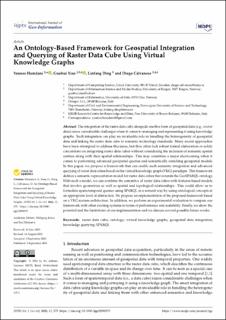| dc.contributor.author | Hamdani, Younes | |
| dc.contributor.author | Xiao, Guohui | |
| dc.contributor.author | Ding, Linfang | |
| dc.contributor.author | Calvanese, Diego | |
| dc.date.accessioned | 2023-12-21T13:23:57Z | |
| dc.date.available | 2023-12-21T13:23:57Z | |
| dc.date.created | 2023-10-09T10:53:03Z | |
| dc.date.issued | 2023 | |
| dc.identifier.issn | 2220-9964 | |
| dc.identifier.uri | https://hdl.handle.net/11250/3108632 | |
| dc.description.abstract | The integration of the raster data cube alongside another form of geospatial data (e.g., vector data) raises considerable challenges when it comes to managing and representing it using knowledge graphs. Such integration can play an invaluable role in handling the heterogeneity of geospatial data and linking the raster data cube to semantic technology standards. Many recent approaches have been attempted to address this issue, but they often lack robust formal elaboration or solely concentrate on integrating raster data cubes without considering the inclusion of semantic spatial entities along with their spatial relationships. This may constitute a major shortcoming when it comes to performing advanced geospatial queries and semantically enriching geospatial models. In this paper, we propose a framework that can enable such semantic integration and advanced querying of raster data cubes based on the virtual knowledge graph (VKG) paradigm. This framework defines a semantic representation model for raster data cubes that extends the GeoSPARQL ontology. With such a model, we can combine the semantics of raster data cubes with features-based models that involve geometries as well as spatial and topological relationships. This could allow us to formulate spatiotemporal queries using SPARQL in a natural way by using ontological concepts at an appropriate level of abstraction. We propose an implementation of the proposed framework based on a VKG system architecture. In addition, we perform an experimental evaluation to compare our framework with other existing systems in terms of performance and scalability. Finally, we show the potential and the limitations of our implementation and we discuss several possible future works. | en_US |
| dc.language.iso | eng | en_US |
| dc.publisher | MDPI | en_US |
| dc.rights | Navngivelse 4.0 Internasjonal | * |
| dc.rights.uri | http://creativecommons.org/licenses/by/4.0/deed.no | * |
| dc.title | An Ontology-Based Framework for Geospatial Integration and Querying of Raster Data Cube Using Virtual Knowledge Graphs | en_US |
| dc.type | Journal article | en_US |
| dc.type | Peer reviewed | en_US |
| dc.description.version | publishedVersion | en_US |
| dc.rights.holder | Copyright 2023 The Author(s) | en_US |
| dc.source.articlenumber | 375 | en_US |
| cristin.ispublished | true | |
| cristin.fulltext | original | |
| cristin.qualitycode | 1 | |
| dc.identifier.doi | 10.3390/ijgi12090375 | |
| dc.identifier.cristin | 2182793 | |
| dc.source.journal | ISPRS International Journal of Geo-Information | en_US |
| dc.identifier.citation | ISPRS International Journal of Geo-Information. 2023, 12 (9), 375. | en_US |
| dc.source.volume | 12 | en_US |
| dc.source.issue | 9 | en_US |

